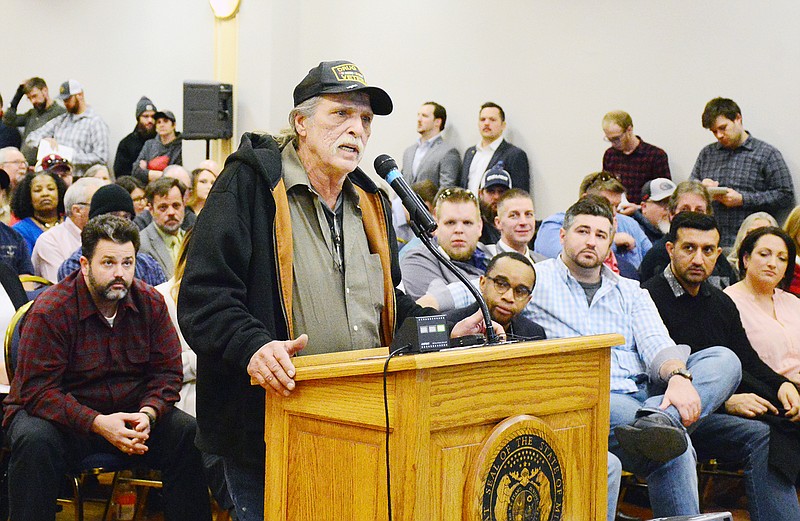The Missouri Department of Health and Senior Services hosted a forum Wednesday night to accept suggestions from the public regarding the formation of rules and regulations for medical marijuana.
More than 350 people crowded into Room 450 of the Governor Office Building for the event, which was moderated by Lyndall Fraker, director of the DHSS Section of Medical Marijuana Regulation.
Voters passed Missouri Amendment 2 on Nov. 6, legalizing cannabis use for specific medical conditions. For months, the section has been developing rules for the growing and distribution of marijuana.
"What we're doing tonight is trying to gather input from the public regarding the rule-making process," Fraker explained to the crowd. "It's not a question-answer period."
DHSS Director Randall Williams started the event by telling those gathered that as a physician who had seen more than 3,000 patients, he had learned, "The best way to get to good outcome is to listen to your patient - in this case, to listen to you."
"We think we will get the best program for the state of Missouri by listening to you."
Dozens of speakers stepped to a podium to provide their thoughts on implementation of medical marijuana.
As they spoke, several themes emerged:
Better access for people with limited mobility;
A focus on providing medical marijuana to veterans;
Improved access in low-income neighborhoods;
Access for felons;
Ways to ensure low cost;
Concerns about how much people can grow for themselves;
Childproofing medical marijuana;
A possible entity to audit the industry;
Getting banking involved; and
Limiting involvement by large out-of-state companies.
There needs to be a way for people who either can't drive because of their conditions or because of their medications to be able to receive prescriptions of medical marijuana, speakers said.
Jacqueline Patterson, of Kansas City, said she moved to California to get access to medical marijuana because it helps her speech and she couldn't get it in Missouri.
"I would like to recommend that you guys allow for delivery because there are going to be a lot of patients who can't drive," she said. "I don't know about the rest of the state, but the transit system in Kansas City isn't all that great for people who have disabilities."
Delivery options would create full accessibility, she said.
Some states have a process for mobile dispensaries, said Steven Faber, regulations chair for the Missouri Cannabis Industry Association. The association attempts to educate Missourians on opportunities provided by the industry in health care, agriculture and small business.
"We have a lot of rural areas in Missouri that may have trouble getting to the dispensary. So, I think a mobile dispensary, whether it's a licensed individual dispensary or adjunct to a brick and mortar dispensary," he said, "I'm sure there is an answer."
It's very important for people with no mobility to have deliveries done, Faber said.
He also touched on concerns that home-growers are too restricted.
"Nowhere that I've seen has the home grow impacted the commercial market," he said. "No more than home brewing of beer impacted (that industry)."
He warned about the dangers of overly restricting home grows. They tend to regulate themselves, he said.
"If I've got some precious plants in my home, I'm going to make sure they're secure," Faber said.
Joy Sweeney, director of the Jefferson City Council for Drug Free Youth, asked the DHSS to be certain the rules include laws that penalize anyone for using medical marijuana while driving, that it provide science-based public awareness campaigns and a toll-free number where the public can report adverse effects of medical marijuana.
She asked that the department conduct compliance checks to be certain youths and people without medical marijuana cards aren't able to buy products. She also recommended roadside checks to protect all citizens from impaired drivers.
"Drug courts to steer users into treatment rather than incarceration," Sweeney said. "I think we've tried to do that in most of the state. We're going to need more people and more help with that."
DHSS will release its initial drafts of rules for public review at health.mo.gov/safety/medical-marijuana/draft-rules.php. The drafts will be posted as soon as they become available.
Suggestions for these initial drafts may be submitted in writing through the suggestion form on that webpage.
According to the site, as of Feb. 7, 418 pre-filed application forms for facilities had been submitted. Along with those forms, the DHSS has received $3,020,000 in application fees. Fees for license applications are non-refundable.
Jeff Mizanskey, of Sedalia, said he's a veteran and a felon. He served more than 20 years in prison and has recently completed his parole.
"I'm hearing a lot of questions and concerns," Mizanskey said. "I'm glad people are getting involved. I think we're headed in the right direction."

